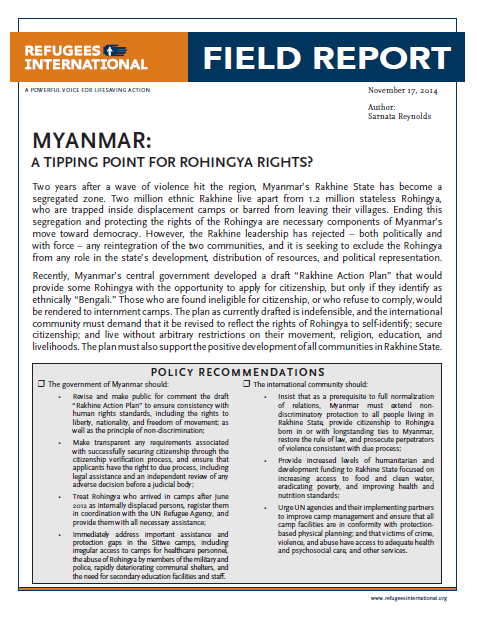Myanmar: A Tipping Point for Rohingya Rights?
By Refugees International • November 17, 2014 Two years after a wave of violence hit the region, Myanmar’s Rakhine State has become a segregated zone. Two million ethnic Rakhine live apart from 1.2 million stateless Rohingya, who are trapped inside displacement camps or barred from leaving their villages. Ending this segregation and protecting the rights of the Rohingya are necessary components of Myanmar’s move toward democracy. However, the Rakhine leadership has rejected – both politically and with force – any reintegration of the two communities, and it is seeking to exclude the Rohingya from any role in the state’s development, distribution of resources, and political representation.
Two years after a wave of violence hit the region, Myanmar’s Rakhine State has become a segregated zone. Two million ethnic Rakhine live apart from 1.2 million stateless Rohingya, who are trapped inside displacement camps or barred from leaving their villages. Ending this segregation and protecting the rights of the Rohingya are necessary components of Myanmar’s move toward democracy. However, the Rakhine leadership has rejected – both politically and with force – any reintegration of the two communities, and it is seeking to exclude the Rohingya from any role in the state’s development, distribution of resources, and political representation.
Recently, Myanmar’s central government developed a draft “Rakhine Action Plan” that would provide some Rohingya with the opportunity to apply for citizenship, but only if they identify as ethnically “Bengali.” Those who are found ineligible for citizenship, or who refuse to comply, would be rendered to internment camps. The plan as currently drafted is indefensible, and the international community must demand that it be revised to reflect the rights of Rohingya to self-identify, secure citizenship, and live without arbitrary restrictions on their movement, religion, education, and livelihoods. The plan must also support the positive development of all communities in Rakhine State.
POLICY RECOMMENDATIONS:
- The government of Myanmar should:
- Revise and make public for comment the draft “Rakhine Action Plan” to ensure consistency with human rights standards, including the rights to liberty, nationality, and freedom of movement; as well as the principle of non-discrimination;
- Make transparent any requirements associated with successfully securing citizenship through the citizenship verification process, and ensure that applicants have the right to due process, including legal assistance and an independent review of any adverse decision before a judicial body;
- Treat Rohingya who arrived in camps after June 2012 as internally displaced persons, register them in coordination with the UN Refugee Agency, and provide them with all necessary assistance;
- Immediately address important assistance and protection gaps in the Sittwe camps, including irregular access to camps for healthcare personnel, the abuse of Rohingya by members of the military and police, rapidly deteriorating communal shelters, and the need for secondary education facilities and staff.
- The international community should:
- Insist that as a prerequisite to full normalization of relations, Myanmar must extend non-discriminatory protection to all people living in Rakhine State, provide citizenship to Rohingya born in or with longstanding ties to Myanmar, restore the rule of law, and prosecute perpetrators of violence consistent with due process;
- Provide increased levels of humanitarian and development funding to Rakhine State focused on increasing access to food and clean water, eradicating poverty, and improving health and nutrition standards; and
Urge UN agencies and their implementing partners to improve camp management and ensure that all camp facilities are in conformity with protection-based physical planning; and that victims of crime, violence, and abuse have access to adequate health and psychosocial care, and other services.
This post is in: Human Rights, Spotlight
Related PostsMyanmar: Free Prisoners of Conscience in Rakhine State End Ongoing Persecution of Rohingya
UN Myanmar Rights Expert: Backtracking on Democratic Space Gains Momentum in Election Year
Myanmar’s Proposed Race and Religion Laws are Discriminatory and should be Scrapped
The FCO’s Human Rights Work 2013
BROUK Welcomes US Senate Resolution on Rohingya









 All posts
All posts